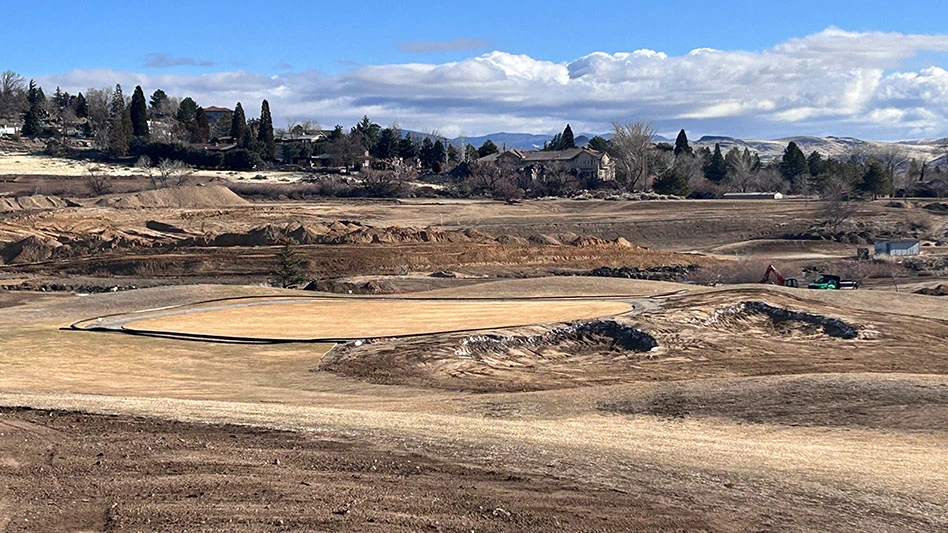CNL Income Properties made a bid to buy 28 golf courses from affiliates of American Golf Corp. for $301 million. The acquisition includes seven private clubs and 21 daily-fee courses, which would be managed by Evergreen Alliance Golf Limited (EAGLE). Additionally, EAGLE proposed to acquire 14 courses – nine of which are third-party leases, and the other five are lease takeovers.
| 42 American Golf Properties to be sold |
American Golf Corp. properties to be acquired by CNL Income Properties: Mission Hills - Northbrook, Ill. Ancala - Scottsdale, Ariz. Tallgrass - Witchita, Kan. Deer Creek - Overland Park, Kan. Arrowhead - Littleton, Colo. Hunt Valley - Phoenix, Md. Meadowbrook - Tulsa, Okla. David L. Baker - Fountain Valley, Calif. Forest Park - St. Louis, Mo. Las Vegas GC - Las Vegas, Nev. Shandin Hills - San Bernadino, Calif. Meadowlark - Huntington Beach, Calif. Micke Grove - Lodi, Calif. American Golf Corp. properties to be acquired by EAGLE Fowler’s Mill - Chesterland, Ohio |
If the deal closes, CNL would own 49 courses in 12 states and become the third-largest golf course owner in the U.S., behind American Golf and ClubCorp. EAGLE would increase the number of courses it operates to almost 100.
CNL, a real estate investment trust, is building its golf course portfolio with mix of private and public courses, as well as courses in geographically diverse locations, says Rudy Anderson, vice president of investments for CNL Income Co., the company that advises CNL. The company, which invests in lifestyle properties including ski areas, marinas and attractions such as theme parks, owns 21 golf courses. EAGLE operates 15 of them. Heritage Golf Group, IRI Golf Management and Billy Casper Golf also lease and manage CNL-owned golf courses.
CNL’s acquisition offer includes several courses in Arizona and Illinois. EAGLE’s acquisition includes eight courses in Ohio. American Golf, which is owned by Goldman Sachs and Starwood Capital Group, is focusing on its courses in its strongest markets, including the West Coast, Atlanta and New York, by freeing up courses in other markets, says Mark Friedman, senior vice president and general counsel of American Golf. Goldman Sachs has invested $150 million in capital since it took over five years ago, and further investment is planned for feature upgrades, including revamping clubhouses and irrigation systems at several courses.
“We take the liability of the risk, but share the upside with the landlord,” Friedman says.
Aside from geography, CNL makes investments based on the state of the industry, and Anderson, who specializes in the golf market, is confident about current state.
“We have tremendous enthusiasm for the influence that 120 million new baby boomers will bring and how they will be affecting these assets through retirement,” Anderson says.
EAGLE aims to improve operations at the courses it will operate, says Joe Munsch, president and c.o.o. of EAGLE. The in-house operations at the courses should remain the same, but the company’s regional and corporate management and agronomic teams will advise the courses, he adds.
“We’re really looking forward to it,” Munsch says. “We will look for anything we can do to improve the quality of the course or member services.”
Where there are clusters of EAGLE-operated courses, there will be reciprocal playing privileges for the members and golfers. EAGLE will also continue to offer privileges for golfers with courses that American Golf continues to own.
The deal is expected to close at the end of the month.
“We’re in the process of discussing the deal with our landlords at our leased properties and introducing them to EAGLE and CNL, as well as doing the usual customary closing activities,” Friedman says.
Get curated news on YOUR industry.
Enter your email to receive our newsletters.

Explore the November 2007 Issue
Check out more from this issue and find your next story to read.
Latest from Golf Course Industry
- The Cabot Collection announces move into course management
- Carolinas GCSA raises nearly $300,000 for research
- Advanced Turf Solutions’ Scott Lund expands role
- South Carolina’s Tidewater Golf Club completes renovation project
- SePRO to host webinar on plant growth regulators
- Turfco introduces riding applicator
- From the publisher’s pen: The golf guilt trip
- Bob Farren lands Carolinas GCSA highest honor





